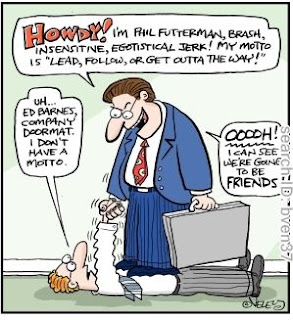~Change means movement. Movement means friction. Only in the frictionless vacuum of a nonexistent abstract world can movement or change occur without that abrasive friction of conflict~
- Saul Alinsky
Two fund-raising committee heads, Edward and Phil, had been given instructions from higher management to reduce a list of 15 potential members shortlisted by them previously to 10. The higher management explains that due to certain constraints, the maximum capacity of the team had to be kept strictly at 12. The 15 people had been specially selected from a pool of 50 and cutting down to 10 was a sizable reduction. To compound the situation, neither Edward nor Phil was willingly to let go of their picks.
Edward's personality tended to favor people. He was generally more sensitive to people, and was a caring, thoughtful committee head. Phil was just the opposite. He was more concerned with productivity, efficiency and considered people's feelings secondary to the work.
They met to discuss the member reduction with their top 10 choices in mind and unfortunately, their choices differ greatly. Edward told Phil that he felt the people whom he had picked had an easy-going nature, were friendly and will be able to work well with the other members. A happy and enjoyable working experience was what Edward had in mind for everyone. Phil however, had a different justification for his choices. Phil selected the members based on their capabilities and work efficiency. Whether the members get along wasn't his main concern. Recognition and appraisal from the higher ups achieved through the funds raised were much more important to Phil. Both of them had a difficult time working things out as they each believed their choice was the right one.
Shockingly, Edward claimed that he had already informed some of the members about their unsuccessful application prior to their meeting as he assumed Phil would agree with his choices.
Phil was outraged and furious.
He couldn't believe Edward had done something so selfish and irresponsible, jeopardizing the whole operation. Those people whom Edward had rejected were considered by Phil to be the few outstanding ones in terms of productivity. Phil has a bad feeling that the team is going to fail but he faces a dilemma now. Should he give in to Edward and hope that everything turns out to be fine? Argue with Edward and hope that he would give in instead? Or withdraw from the team and forfeit the opportunity to earn a good portfolio for himself.
When there is a change, there is bound to be friction. Imagine you are in Phil's position. What would you do to resolve this conflict? Is there any better alternative Phil should consider?
When there is a change, there is bound to be friction. Imagine you are in Phil's position. What would you do to resolve this conflict? Is there any better alternative Phil should consider?




7 comments:
Hi, Terence,
Ella is here. My personality is similar to Phil and have met the same problem before. From the conflict, I learnt that the leaders need to make the agreement on the selection issue before taking action. As a leader, it is very important to consider the thoughts of other team members and do some adjustment on the final decision. Thinking from the other side of view is an essential personality for a leader.
What do you think?
Ella
Hi Ella,
Thank you for your comment. I think I used to have a personality worse than Phil. Just like Phil, I am a work-oriented person and if I were to be put in the same situation, I would have also done the same as Edward - 先斩后奏 (act first,report later) because sometimes in a stalemate like this, a conclusion may never be reached.
But now I do agree with you that considering the point of view of others is also essential. However, in this case, what happened cannot be changed anymore so what would you do if you were Phil then?
Hi Terence!
First, I think what Edward has done (informing others about their outcome without consulting Phil) is a little out of character. This act shows that Edward is not all that thoughtful... but then again, we are humans and we have our moments of faltering eh?
If Phil was to let Edward go ahead with his actions without voicing out this opinions, his bottled disagreement will fester and eventually backfire on him (literally haha). As I imagine Phil to be a forward-thinking person, letting Edward go without an opinion is not an option.
I can commiserate with Phil as I am a go-getter also so I can appreciate this position. Phil should sit Edward down separately, and talk to him about the situation. A compromise will eventually be reached- one is bound to get tired of arguing and agree to the compromise. Of course, this entails having two reasonable people to talk it out, which I imagine Edward and Phil to be. :)
Unfortunately, this means business. Personally, I would never settle for any of the three solutions. Sit down to wait for a shimmer of light? Argue over spilt milk? Withdraw? What are they, kids? This is where EQ comes in. Phil by all means should, seemingly adhere to Edward’s pick of teammates while currying favour with the higher-ups, mentioning every now and then how he is trying his very best to work with Edwards and his choice of teammates while devilishly and subtly destroy what they are working on.
Result? Edward gets the boot and Phil gets to make the call. This is what we’ve been taught. Resolving conflicts the smart way – the way in which you win. By understanding his own position, the motives of the higher-ups and the problem being Edward, Phil can easily advert any future conflict with Edward (Edward having bitten the dust) plus give himself a win.
Of course, this is just my hypothetical comment to your hypothetical post. Enjoy!
Hi Terence,
If the things are unchangeable, I will let it go and try to make some difference in the following work. Or, I may find that what my previous thought is wrong.
Ella
Hi Terence,
If I were Phil, I would do my best to reach a compromise with Edward. Maybe, each of us could remove one or two people from our own lists. After all, compromising is also part of resolving conflicts.
Also, being Phil, I would not have withdrawn from the team because if I hadn't made any efforts to discuss the matter with Edward in the first place, I would have definitely missed out on the opportunity to earn a good portfolio.
Hi people! Like Ms Lim would say, "Thank you for sharing! =)"
Doris: You are right! Sometimes people do stupid things or make an unwise decision when they are really desperate. So I presume you would give in to Edward?
Elaine: Wow! I actually did thought of your alternative which I personally consider an effective solution but I never had the courage to post it up (*This is after all a module on communication and interpersonal skills :p ). However, I think it is saddening and extreme to have to resort to such office politics. One should probably not do so unless its really the last straw. (In this case, I think Phil is a nice guy who do not deserve such a treatment)
Ella: I agree with you. I would make the best with what I have now. I might get unexpected good results.
Shawn: Yes, I would probably sort out my differences with Phil and probably get another neutral party to share his/her point of view. I think the essence of this example is not about compromising but rather it is about realizing your own flaws and weaknesses and allowing others to compensate it for you with their strengths.
Post a Comment